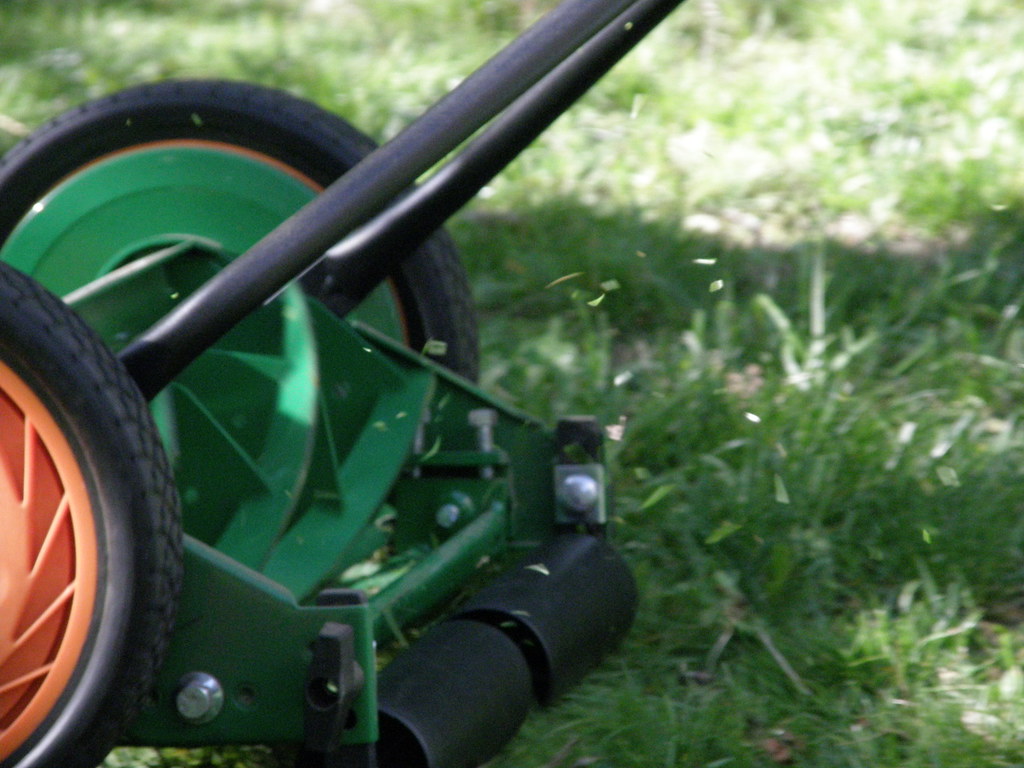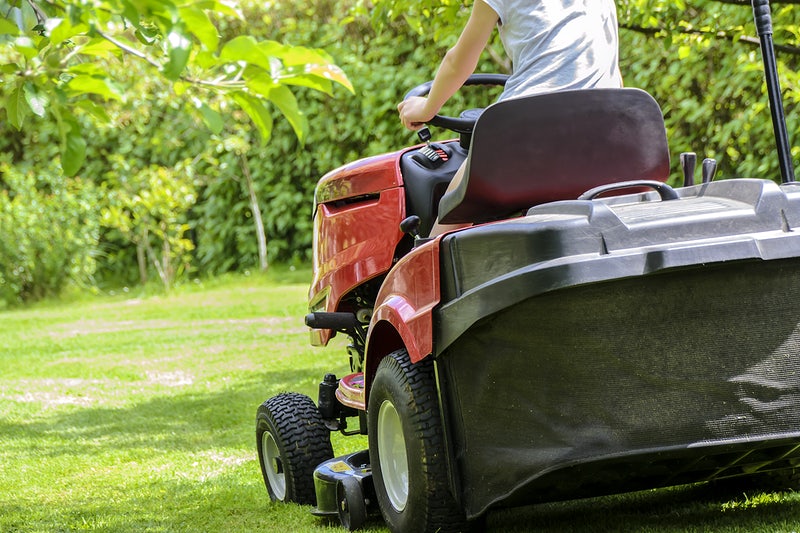
The sun rises, casting a golden glow over your meticulously manicured lawn. You step outside, coffee in hand, ready to savor the beauty of your handiwork, a testament to hours of sweat, precise edging, and perhaps a few muttered curses under your breath. This isn’t just grass; it’s your masterpiece, your pride, the canvas of your home’s first impression. But then, your eyes land on it – a jagged, unholy line of devastation, a swath of uneven stubble, or worse, a fresh pile of someone else’s grass clippings assaulting your pristine landscape pavers. Uh-oh. You know that sinking feeling, don’t you? It’s one of the worst types of problems that homeowners could have: neighbors. They’re the people we must live near and around, making these issues not just about property, but about our daily lives and peace of mind.
When we have a problem with a neighbor, like a neighbor who mows over the property line, it can create precarious situations. The sting of seeing your yard – your personal work of art – defaced by someone else’s mower is akin to witnessing someone take a paintbrush, regardless of the color, and making one giant stroke across a painting from Monet, Picasso, or Van Gogh. For many homeowners, their beautiful landscaping and well-manicured lawns are like a first impression, the first greeting guests receive. And remember, we only get one chance to make a first impression. So, when a neighbor mows over property line borders, it is a near-offense. It’s an intrusion, a blurring of lines that feels deeply personal.
The emotional toll of such an intrusion is real. It’s the aggravation, the frustration of wasted effort to make your lawn perfect, all for it to be undone by a thoughtless act. Maybe it’s a drunken swerve that tears up the visual aesthetics, or perhaps it’s the unsightly dirt patches now intruding into your yard because the neighbor’s mower is set to “kill earthworms” level, and they just can’t stay on their side of the property line. We get it. That feeling of violation, of your personal space and effort being disrespected, can truly gnaw at you. It’s easy to walk out the morning after putting the final touches on your yard, only to see that it happened again. Maybe for the how many-eth time? And yes, it can be glaring and obvious. But before you let anger take root, remember the old adage: “cooler heads will prevail.”

Indeed, it’s easy to make all the wrong assumptions. The truth is, we most often don’t know. We don’t know if the neighbor mowed over the property line intentionally or not. We don’t know if they are too stubborn, short-tempered, or unreasonable to work with until we try. Perhaps they didn’t even realize they were making huge chunks of your yard disappear. Or maybe they think they’re doing you a favor, like the neighbor who just *keeps* cutting your grass without asking. Yes, that happens too, and while it might seem like a kind gesture, it can feel awkward, intrusive, and certainly isn’t respecting your boundaries. It is simply not normal for your neighbor to mow your lawn without asking you first, and it’s perfectly normal to think that it is rude.
So, what’s the very first, crucial step when dealing with these turf-taming troubles? It’s always a reasonable and friendly conversation. Believe it or not, talking and meaningful conversation (like Please don’t mow over my property line) works. Studies, tests, surveys, and reports all suggest that conversation has many benefits on many levels. If the neighbor mows over the property line or is doing something aggravating, talk to them. It might feel like the last thing you want to do when you’re fuming, but it’s the most powerful initial move in your arsenal. The objective here is to get the message across to your neighbor so they stop, once and for all, while ideally preserving neighborly relations.
One of the greatest benefits of conversation is the connection it fosters. It helps us to connect with people, and that connection can help bond people together. It is much easier to work with someone who isn’t a complete stranger. And people are also more naturally inclined to listen to and care about what others say when they feel a sense of rapport. We aren’t saying it is necessary to befriend every person in the neighborhood, but a little social propriety can go a long way. Approaching your neighbor calmly, expressing your concerns, and listening to their perspective can prevent misunderstandings and often resolve the issue without escalating tensions. It allows for an exchange of viewpoints that might otherwise be lost in assumptions and frustrations.

Consider the profound power of simple communication. What if your neighbor is just one of those people who really doesn’t care about a manicured lawn? To them, it might just be a chore, like taking out the trash – just get it done. In fact, what if the neighbor never even notices the glaring slices into your lawn made by their mower? What if they don’t even realize they are killing dirt with their blade deck set that low, and along with it, huge chunks of your yard? And what if one day, someone decides to kindly point it out to them? What if that someone was you? That is the profound power of conversation: the ability to convey important thoughts, ideas, concepts, and concerns. Concerns like a neighbor who mows over our property line, or one who just keeps cutting your grass even though you haven’t asked. It’s about opening a dialogue where a problem can be identified and discussed, leading to a resolution.
A conversation is also one of the easiest ways to convey a sense of value to someone. If we move ahead without so much as a request and immediately build that ten-foot wall to keep our neighbors from mowing over the property line – what does that say about us? Not only does a lack of conversation fail to convey any sense of or appreciation for their ability to reason, but it also conveys a lack of value towards them. Conversation simply states that you value them, either as a neighbor, fellow human being, friend, or at the very least, as someone who shares your property line. It’s an act of respect, offering them the chance to understand and correct the behavior on their own. It allows for a dignified resolution, should the neighbor be receptive to your concerns.
When approaching your neighbor about them cutting your grass without permission, the same principles apply. You might feel awkward, as it’s simply not normal for your neighbor to mow your lawn without asking you first. But instead of letting that discomfort fester, give them the benefit of the doubt. It’s likely they were just trying to help you out and don’t expect anything in return. Your goal is to instill your boundaries politely. You can start by thanking them for cutting your lawn, then gently explain that you actually enjoy cutting the lawn yourself and would prefer to do it. You can even embellish a little and say you look forward to it every week, even if it’s not entirely true! This non-confrontational approach is key to getting the message across without causing unnecessary friction.
Timing is key for these initial conversations. Approach them during an easy, relaxed time of day. For example, if they are grabbing the mail, gardening, or cutting their own grass. Just ensure that you’re doing it in a comfortable situation, and not when either of you is rushing to work. You want to give yourself enough time to properly explain yourself and have a decent conversation about it. If they are old-fashioned, they might genuinely think they’re doing a kind favor. So, ensure you ask them to stop cutting your grass in the kindest way possible. Give them the benefit of the doubt that they were just trying to help you out and were not trying to cause you any discomfort. It is not rude to ask them to stop, as your grass is on your property and belongs to you; what can make the situation rude is asking them in an impolite manner.

Now, let’s talk about the dreaded grass clippings, a truly annoying form of property invasion. Dealing with a neighbor who repeatedly blows grass clippings onto your property can be frustrating beyond words. Beyond being an eyesore, it may raise concerns about property rights or even potential legal disputes. Understanding property boundaries is fundamental when dealing with any type of encroachment, and that certainly includes unwanted grass clippings. Property deeds, surveys, and zoning laws are what define these boundaries, and any actions crossing these lines without permission may violate property rights. Many disputes stem from misunderstandings about property lines, which a clear conversation, backed by knowledge of these fundamentals, can often help clarify.
If grass clippings are persistently disrupting the cleanliness or aesthetic of your property, it could very well be classified as a “nuisance.” This legal term refers to an act that significantly interferes with the use and enjoyment of one’s property. Imagine your yard, once a haven, now plagued by the stench of decaying grass, attracting unwanted pests. This isn’t just a minor annoyance; it significantly impacts your ability to enjoy your own space. And if the debris crosses property lines, even unintentionally, it could be considered “trespass,” which involves unauthorized entry onto another’s property, including placing objects like grass clippings. The distinction between nuisance and trespass affects the type of legal remedy available, and both claims require strong evidence to support the assertion that your property rights have been violated. Proving nuisance involves demonstrating how the grass clippings have affected your enjoyment of your property, while trespass focuses on showing the repeated crossing of property lines by the debris itself.
Why are grass clippings such a big deal beyond just looking messy? Well, they may also raise environmental and health concerns. Large piles of grass can attract pests, mold, and other harmful organisms. For example, damp clippings may become breeding grounds for mosquitoes, which can carry diseases. Decaying organic matter can produce unpleasant odors and attract rodents or other wildlife. Imagine trying to host a backyard barbecue with the pervasive smell of fermenting grass wafting through the air, or battling an increased mosquito population because of your neighbor’s carelessness. These are real, tangible impacts on your quality of life.
Furthermore, in some jurisdictions, environmental laws actually address improper disposal of yard waste, particularly if it poses a risk to public health or ecosystems. Certain states, for instance, prohibit dumping yard waste in ways that obstruct stormwater drainage systems or contaminate nearby water sources. Violations may result in fines or other penalties, so your concern isn’t just about aesthetics; it’s about potential hazards and adherence to local regulations. If your neighbor’s actions cause environmental harm, you may have additional legal recourse, potentially prompting an investigation by local environmental or public health agencies, which could lead to enforcement actions such as fines or cleanup mandates. Highlighting these broader implications can strengthen your case when addressing the issue with your neighbor.

Regardless of whether it’s mowing over the line, cutting your grass without permission, or blowing clippings onto your property, thorough documentation is essential when dealing with repeated instances. This isn’t about being confrontational, but about being prepared, gathering the facts should your initial friendly overtures not yield results. Think of it as building a factual narrative, a silent but powerful witness to the ongoing issues. Record the dates and times of each incident to demonstrate frequency and patterns. Detailed notes should describe the volume of debris, its impact, and any cleanup attempts you had to undertake. This meticulous record-keeping, building a solid paper trail, is invaluable.
Clear photographic evidence is crucial. Capture images showing the grass clippings on your property, ideally with context to establish location and scale of the problem. If possible, videos capturing the act can provide further undeniable proof. This visual evidence helps illustrate the problem clearly, not just to your neighbor (if you choose to show them), but more importantly, to authorities or in court, if necessary. It transforms a subjective complaint into an objective, verifiable issue. This step is not about being aggressive; it’s about being smart and covering your bases, just in case that initial friendly conversation, for all its benefits, doesn’t quite hit the mark. It’s about arming yourself with the necessary tools for when “please don’t” turns into “you have to stop.”
Speaking of communication, while a direct and respectful conversation is often the most effective first step, sometimes a verbal chat isn’t enough, or it proves fruitless. If face-to-face communication doesn’t work, consider putting your concerns in writing. A formal letter can serve as a crucial record of your attempts to resolve the issue and clearly articulate your grievances. This documented effort can be invaluable if the situation requires further legal action, acting as a formal notice that you’ve attempted amicable resolution. This demonstrates your earnest effort to solve the issue without escalation and serves as a clear statement of your boundaries and expectations.

But it’s not just about neatness; it’s about safety too. Blowing grass clippings onto the road might seem harmless, but it can create serious safety hazards, especially for motorcyclists who risk losing traction on slick surfaces. Many states and cities have laws against depositing debris on roadways that could injure people or damage vehicles. Violations can lead to fines, and in some cases, even civil liability if an accident occurs. This isn’t just a minor annoyance; it’s a potential legal nightmare.
Beyond the road, those piles of decaying grass clippings on your property can attract all sorts of unwanted guests: pests, mold, and other harmful organisms. Damp clippings are a breeding ground for mosquitoes, which, let’s be real, no one wants buzzing around. They can also stink to high heaven and attract rodents or other wildlife. Imagine trying to enjoy a backyard BBQ with that stench wafting over – not exactly the vibe you’re going for, right? These are real, tangible impacts on your quality of life and enjoyment of your property.
In some places, environmental laws specifically prohibit improper yard waste disposal, particularly if it poses a risk to public health or local ecosystems. Dumping clippings in a way that obstructs stormwater drainage or contaminates water sources can result in fines. Highlighting these broader implications – the environmental and health hazards – can seriously strengthen your case, whether you’re talking to your neighbor or, if necessary, to authorities. It transforms a petty dispute into a matter of public concern.

So, what happens when conversations fail, and physical barriers aren’t enough, or the neighbor just doubles down on their annoying habits, like throwing your sprinkler back into your yard? That’s when you move into the realm of formal and, if necessary, legal action. This isn’t about being vindictive; it’s about asserting your absolute right to enjoy your property. Remember those terms we touched on earlier? Nuisance and trespass. If persistent grass clippings significantly interfere with your ability to use and enjoy your property – the smell, the pests, the sheer mess – that could be classified as a nuisance. And if their debris is repeatedly crossing your property line, even by accident, that’s trespass. Knowing the difference matters, as it dictates your potential legal remedies.
For both nuisance and trespass claims, you need evidence – and lots of it. Those photos, videos, and detailed records of incidents we mentioned in Section 1? They become your best friends here. They transform a subjective complaint into objective proof, making your case undeniable to authorities or in court. Document everything: dates, times, volume of debris, impact, and any cleanup efforts you had to undertake. This meticulous record-keeping, building a solid paper trail, is invaluable.
If face-to-face chats haven’t worked, the next logical step is a formal letter. This isn’t just a stern note; it’s a crucial legal document. A formal letter clearly articulates your grievances and serves as a written record of your attempts to resolve the issue amicably. This documented effort can be invaluable if the situation requires further legal action, acting as a formal notice that you’ve attempted amicable resolution. It’s like putting them on notice, demonstrating that you’re serious about protecting your property and that you’ve tried to be reasonable.
When all else fails, it’s time to call in the big guns. This means exploring legal remedies, which can range from filing a formal complaint with local authorities to consulting an attorney. Your first stop might be your municipal code enforcement division. These departments typically handle complaints about code violations, including yard waste on public property or nuisance issues. They can investigate, and if a violation is confirmed, they might issue a warning, a Notice of Violation, or even fines. This can prompt an investigation and potentially lead to enforcement actions, such as orders to cease the behavior.

For minor damages or cleanup costs, small claims court can be an option. It’s a less formal process than a full-blown lawsuit, where you can seek compensation for the direct costs incurred due to your neighbor’s actions. Think of it as getting reimbursed for their mess, a small victory in the grand scheme of neighborly wars. This avenue is designed to be accessible for individuals without extensive legal expertise, making it a viable option for many homeowners.
If your neighbor stubbornly continues to cross your property line with their mower or clippings, they are technically trespassing. While it seems drastic, you can file a police report for trespassing. A warning from law enforcement might be just the wake-up call they need to finally respect your boundaries. Some neighbors are just stubborn and don’t understand your boundaries, so this warning might be necessary. If it doesn’t scare them off, then reporting them is the next logical step.
For more severe, ongoing issues that significantly disrupt your peace and enjoyment of your property, you might consider suing for private nuisance. This aims to get a court order to force them to stop or even seek compensation for emotional distress. When anyone disrupts the enjoyment of your property, you have a chance of having them charged with private nuisance. This is essentially when someone gets in the way of you living in peace and enjoying your home.
Before any legal action, you need ironclad proof of your property lines. Your title deed or a land survey is your go-to document. If you don’t have them, contact your real estate lawyer or local land and building office. If a survey was never done, hiring a licensed land surveyor (often around $150) will provide the official document you need to show exactly where your boundaries are. This can even clear up a genuine misunderstanding on their part or provide undeniable proof in court.

If things escalate, especially if an accident occurs due to clippings on the road or if you receive legal threats, consulting an attorney specializing in property law is highly advisable. They can guide you through the complexities, assess the viability of a lawsuit, and advise on your rights and obligations, ensuring you take the most effective course of action. Understanding the extent of your responsibility regarding adjacent public roads, particularly concerning the actions of hired contractors, can be complex, and an attorney can clarify potential obligations and defenses.
Enforcement of rules prohibiting grass clippings in roadways is typically handled by municipal agencies, such as city or county code enforcement divisions, rather than state police. These departments respond to complaints about potential code violations, including those related to yard waste and debris on public property. The enforcement process often starts with a citizen complaint. Upon receiving a report, a code enforcement officer usually inspects the location to verify the violation. If confirmed, the officer typically contacts the property owner or occupant, and initial actions often focus on education and voluntary compliance. An officer might issue a warning or a formal Notice of Violation, detailing the issue, citing the relevant ordinance, specifying corrective action (like removing the clippings), and setting a compliance deadline.
Dealing with neighborly disputes over grass clippings or property lines can feel like a never-ending battle, turning your peaceful sanctuary into a war zone. But remember, you have rights, and a whole toolkit of solutions at your disposal. From friendly chats and physical barriers to understanding local laws and, if necessary, seeking legal remedies, the goal is always the same: to protect your personal masterpiece – your home and yard – and reclaim your well-deserved peace of mind. It might take persistence, but with the right approach, you can restore harmony to your shared green frontier and finally say, ‘Don’t worry, I’ll take care of it!’ to those pesky lawn invaders.



